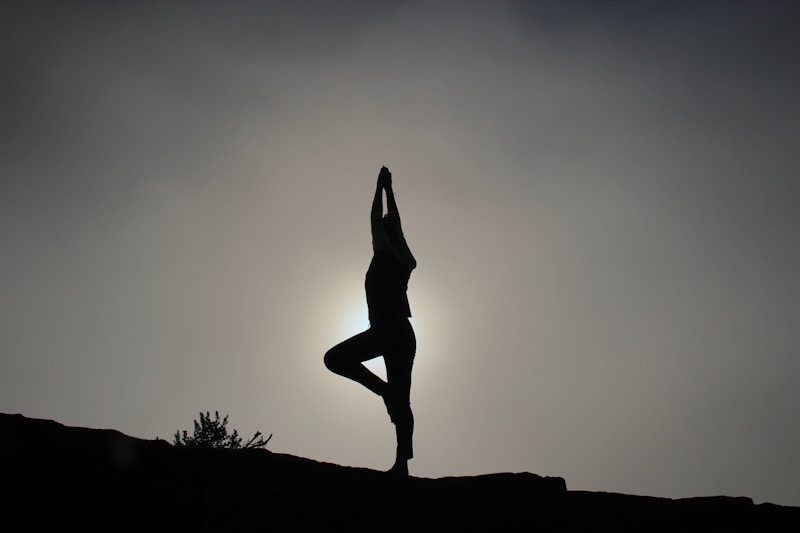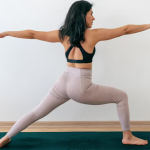Envy is a dark, hidden emotion. It can sour friendships, harden hearts and most of all, poison yourself.
In the yoga world, where the underlying philosophy is based on love, light, and unity, the dark underbelly of envy and jealousy goes un-spoken about, but it doesn’t mean that it’s not there.
Sometimes you’re the one feeling the envy, and at other times it might be directed against you. But we’re here to tell you that feeling envious of someone else is normal, and can even be turned into a positive.
The green-eyed monster
There’s a difference between envy and jealousy. Envy is when we covet what someone else has, whereas jealousy is when we feel something we already have is threatened by a third party. Yoga envy is when someone on the mat next to us calmly catches hold of their feet in kapotasana, while we flail two feet from our feet and fume with frustration. Yoga jealousy is when we secretly revel in the fact that we’re the only one in the room who can do a press handstand, and then have that taken away by some pretender to the handstand throne.
According to the yamas and niyamas, envy is a relative of hatred. It exists when we wish others ill or desire to possess what they have. The flipside of this is that if they are less, we feel like we are more. A traditional Indian story on the topic of envy goes that a farmer encounters a great magician, who tells him he can have anything he wants. The farmer’s reply to this is that he wants his neighbour’s cow to die.
Another facet of envy is that it is usually directed at someone who you feel some degree of empathy with. I’m not jealous of my senior teacher’s yoga skills, because they’re light years ahead of me, but I might be jealous of my peers, who I feel in competition with.
It’s usually to do with the fact that they are doing something that we feel we want to have or be able to do too. It is also often linked to a sense of what is lacking in ourselves and therefore, an inner sense of inferiority.
Why we feel it
We are a product of our upbringing and our society. In the UK, our education system, with its relentless method of testing and ranking us with our peers, encourages us to think that we are all comparable to each other. In order to be ‘the best’, we need to be ‘better’.
This continues once we leave school or university and enter the world of work. We have to compete in order to get the jobs in the first place, and then, carry on competing to get to the top of the ladder.
B. K. S. Iyengar describes this difference, as that between Yoga (as it should be), and Western competitive sports.
“Yoga sees the body quite differently than Western sports, which treats the body like a racehorse, trying to push it faster and faster and competing with all other bodies in speed and strength.”
In the West we have a tendency to continue with this idea of competitive sports (and competitive living in general) and take the same attitude onto our yoga mats, so that we’re constantly checking out ‘the competition’ and seeing whose face is closer to their legs in uttansana (standing forward fold), who can stay up the longest in sirsasana (headstand) and (like a grown-up version of Sleeping Lions) who can stay the stillest in savasana.
What we’re aiming for
In yoga, we’re aiming for nothing short of perfection. We’re aiming for the perfect union of mind and body, through the repeated practice of yoga for many years. But, along the way, we start to look around and compare our yoga journey with the one that others are on.
We are told, “Don’t compare yourself to others”, but we are social creatures and it’s hard not to. However, there is a flip-side to this creeping envy of others. The ‘tapas‘, or burning desire to practice that is so natural in the early days of discovering yoga, is hard to maintain as our progress starts to plateau.
When we find that we are scrolling through fabulous yoga accounts on Instagram and feeling that familiar pang of envy, instead of telling ourselves off, we should take a moment to examine that feeling. Because the suppression of our emotions doesn’t work. It is about channeling and transforming the emotions we feel.
We need to ask ourselves why we’re feeling envious. Is it because the person we are looking at seems to have it all, or because they make it look so easy, or because they’re a yoga teacher? Once we begin to understand what it is we desire, we can then start to do something about it.
What’s Important
Let’s take the Advanced series in Ashtanga yoga. If you’re an Ashtanga yogi, (and respect if you are), then traditionally, your practice is about working through the primary series and finding it ‘easy’ before you can then move on to the next series. The primary series is 90 minutes of continuous vinyasa, linked through the all-important sun salutation. So, for many yoga practitioners, even that is beyond what they can achieve.
But just because they don’t move on to the Advanced series, does this mean they are any less of a yogi? Of course not. Kino MacGregor, the Ashtanga yogi and teacher, says, “More poses don’t make you a better yogi”. She’s extremely advanced and can wrap her legs around her head, but her advice is that the real yoga is finding your own limits. In her words, “Wherever you meet your challenge is where your yoga begins.”
That wise old Iyengar again:
“Never compare with others. Each one’s capacities are a function of his or her internal strength. Know your capacities and continually improve upon them.”
How to turn Envy into Joy for others
Once we realise that envy is just the misplaced desire to improve ourselves, then we can start to practice feeling envy’s happier twin sister – Maitri, or ‘the cultivation of friendliness towards those who are happy.’
Envy and jealousy feed on our insecurity and our sense of others being better than we are. This negative stance means that we leak energy, becoming smaller and weaker inside. The opposite of these feelings is love.
In order to feel genuinely happy for the good fortune of others, as they fall gracefully into a back arch, is to first feel love for ourselves. A good place to start this practice is in savasana. When you’ve got to the end of your lesson or practice bathe yourself in self-love – from the biggest muscles to the smallest skin cell – your body has worked hard for you, and it deserves some gratefulness.
And the next time we notice ourselves feeling envious of someone, instead think about what it is that you can do to achieve your goal, remembering that real yoga isn’t the pose itself, but the struggle to get there in the first place.













